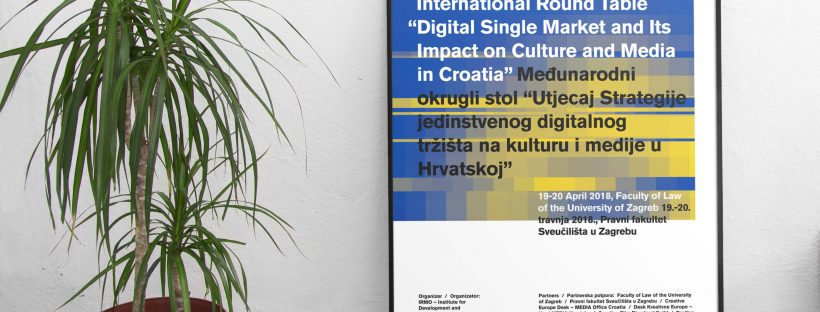Zagreb, Croatia, 19-20 April 2018
Venue: Council Room at the Faculty of Law, University of Zagreb
Address: Trg Republike Hrvatske 14
Organizer: IRMO – Institute for Development and International Relations
Framework: Jean Monnet project ‘EU Competences and National Cultural Policies: Critical Dialogues’ (2016-2018)
Supporting partners:
- Faculty of Law of the University of Zagreb
- Creative Europe Desk – MEDIA Office Croatia
- Croatian Film Directors’ Guild
- Ministry of Culture of the Republic of Croatia
The round table working languages are English and Croatian (with simultaneous interpretation)
Registration for the international round table ‘Digital Single Market and Its Impact on Culture and Media in Croatia’ is now open!
The round table will place emphasis on the changes that the Digital Single Market (DSM) strategy brings to the cultural and media sector in Croatia. By gathering researchers, cultural professionals and policy-makers, the round table will promote focused thematic discussions, which will concentrate on the contextualization of the DSM strategy for culture and the media in the EU.
The programme of the round table, that will take place on 19 and 20 April, will include:
- Introductory Keynote Lecture by Professor Katharine Sarikakis from the Department of Communication, University of Vienna entitled “Culture and the (New) Single Market: Reproducing Regimes of Dominance or Rebooting the New Europe?” (20 April)
- Introductory Discussion – “Digital Single Market and Its Impact on Culture and Media: Institutional and Regulatory Aspects” (19 April)
In this session Ms. Anja Jelavić, Head of the International Cultural Cooperation and European Affairs Sector of the Croatian Ministry of Culture and Mr. Božo Zeba, Acting deputy secretary of state at Central State Office for Development of Digital Society will present initiatives being developed by Croatian policy makers concerning DSM reform in Croatia.
- Three Panel Sessions, as follows:
Panel 1 – Online Platforms and Media Sustainability in Democratic Societies (19 April)
The aim of this panel is to discuss how online platforms influence local media and communication industries in a political, cultural and economic sense. In particular, the panel will focus on the impact of online platforms on digital advertising, media sustainability, market competition and media pluralism, and will discuss public subsidies for media industries and citizens’ alternatives to market driven frameworks.
Panel 2 – Copyright, Authors’ and Users’ Interests: How to Foster Creativity? (20 April)
Having in mind the context of small EU countries like Croatia, the European tradition of the protection of authors’ rights, the changing role of collective management organizations (CMOs), the rights of users to access culture, etc., this panel will question whether the DSM reform brings benefits for the cultural and media sectors or primarily for the ‘big players’ in the field of creative economy. As these issues have serious implications for the cultural diversity and media pluralism in Member States, they need to be addressed not only from the perspective of market-oriented mechanisms, but also from the perspective of culture as a public good.
Panel 3 – Striking the Balance Between Culture and Economy: What Role for Heritage? (20 April)
This panel session will emphasize some important questions concerning the cultural heritage sector: What would be an adequate conceptualisation of IPR in the digital age that would ensure the preservation of the robust public domain and the users’ rights from the analogue age, taking into account that the right to obtain and share knowledge and the right to create and re-create are central to the survival of any culture and our cultural memory? If we consider our cultural heritage to be a resource that triggers reflections and new insights, that should be preserved and passed on to the next generations, and that should constantly be questioned and rediscovered by individuals who breathe new life into it in the present time, we need to ensure that our cultural references (from both the recent and the distant past) stay alive in our cultural memory. We either use it or we lose it, as digital culture represents a vital part of our future heritage. Will the education and the heritage sector be able to take real advantage from the opportunities presented by the environment of digital networks?
The preliminary round table programme is available here.
For more detailed information, please see the round table announcement.
Please register for the participation at the round table via the provided registration form.
Please register early, as places are limited by the capacity of the venue (seating maximum 80 persons), and no later than 15 April.
For further questions, please contact us at culpol@irmo.hr.
Other materials:
DSM_International-Round-Table-Web-Report

